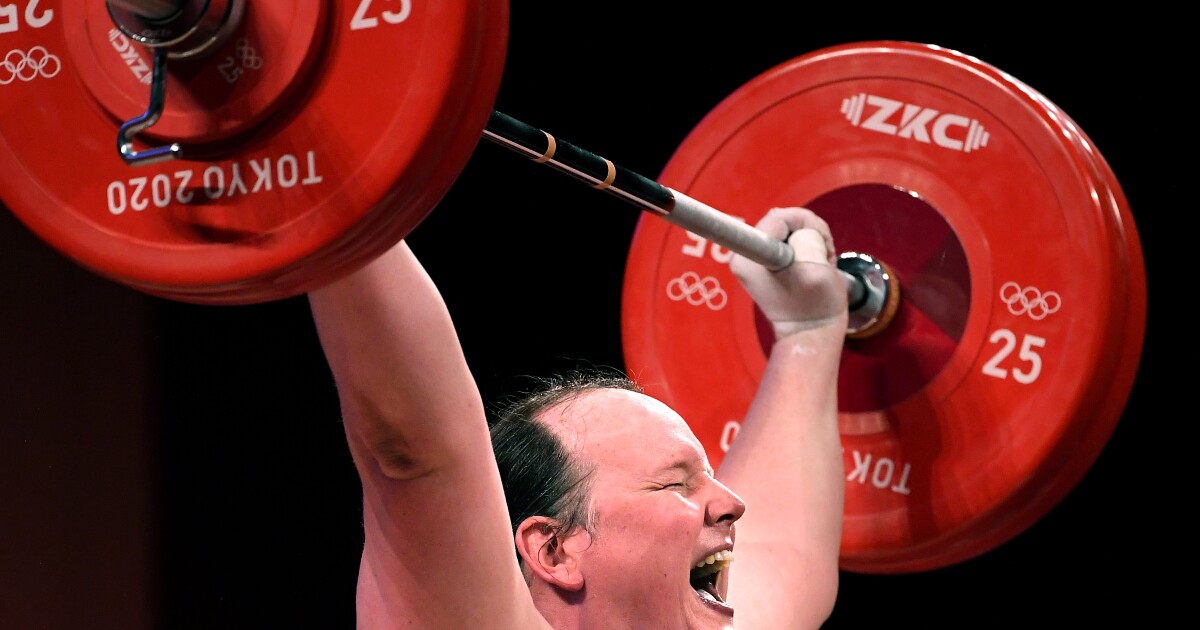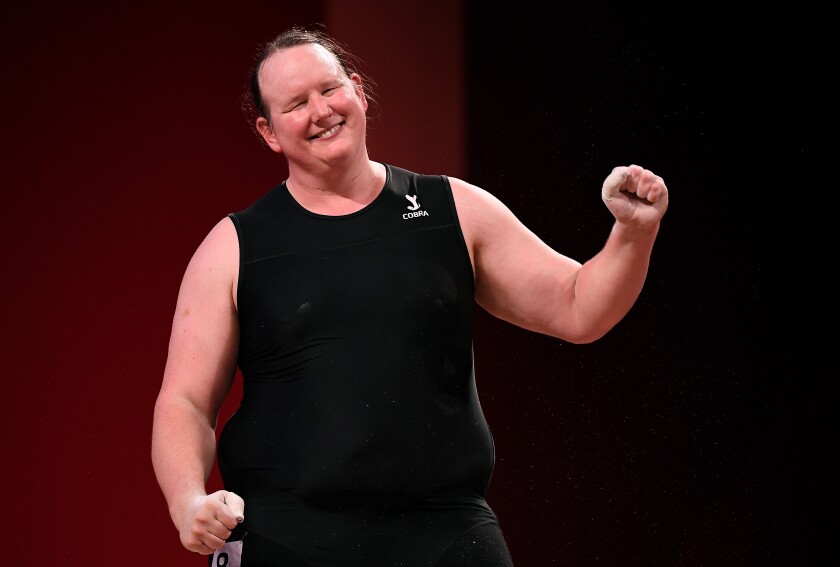
For Laurel Hubbard and other transgender athletes, change is finally coming to Olympics
Reporters from around the world showed up hours early, waiting in line for a chance to interview Laurel Hubbard. Now, as she made her way into the mixed zone, the room where athletes answer questions after competition, the assembled media leaned close and held out tape recorders to catch every word.
It did not matter that the New Zealand weightlifter had just missed on all three of her snatch attempts. It did not matter that she was the first athlete eliminated from the evening session of the super-heavyweight division.
A representative from the New Zealand team accompanied Hubbard into the room and announced that she would make a brief statement and would not be taking any questions. The 43-year-old rarely speaks publicly.
Still, reporters wanted to hear what she had to say.
With a baggy gray sweatshirt draped over her large frame and a brown baseball cap tugged down over dark hair, Hubbard spoke into a microphone.
“Sport is something that all the people around the world can do,” she said. “It’s inclusive, it’s accessible and I think that’s just, just really fabulous.”
Everyone listened because on Monday night at the Tokyo International Forum, Hubbard became the first openly transgender athlete to compete in an individual sport at the Olympics.
:::
The Tokyo Games are setting a precedent. Though Hubbard is widely considered the first, she is not alone.
BMX rider Chelsea Wolfe arrived in Japan as an alternate on the U.S. women’s freestyle team. A Canadian women’s soccer player named Quinn, making their second trip to the Olympics, recently came out as transgender nonbinary — a person who neither identifies exclusively as male or female.
Change has not come easily.
“A big cultural war has erupted around this,” said Tom Farrey, executive director of the Sports & Society Program at the Aspen Institute. “I think it’s a conversation that has a lot to do with issues that go well beyond sports to how we organize our society.”
The International Olympic Committee first allowed transgender athletes in 2004 but only if they had undergone sexual reassignment surgery. None showed up.
Revised IOC guidelines in 2015 placed no restriction on athletes who transition from female to male. For male-to-female cases, officials drew a line between the sexes — anyone wishing to compete as a woman had to register below a maximum testosterone level or, if above, had to take medication to alter their body chemistry.
“These are really hard discussions because the science gets murky,” said Mark Dyreson, a sports historian at Penn State. “It keeps changing and evolving.”
Though much of the scientific community believes testosterone is the primary reason for the performance gap between men and women in many sports, some remain skeptical. Critics note that the hormone occurs naturally in both men and women.

New Zealand’s Laurel Hubbard smiles and gestures to the crowd after failing to advance at the Tokyo Olympics on Monday.
(Wally Skalij / Los Angeles Times)
“It’s not possible to make the flat-footed statements that people want to make about the relationship between testosterone and athleticism,” Katrina Karkazis, an Amherst College professor of sexuality, women’s and gender studies, said in a 2019 interview. “It’s far more complicated.”
Research has identified other factors, including gonads, secondary sex characteristics and internal genitalia. Individual athletes may respond differently to testosterone based on hormone receptors.
There is another facet of this issue that affects women with what officials call a “difference of sexual development,” meaning their body chemistry does not fit established definitions.
Caster Semenya of South Africa won the women’s 800 meters at the last two Olympics but was barred from Tokyo when international track officials lowered the testosterone limit in 2018. Her case has proceeded through several unsuccessful appeals and is now before the European Court of Human Rights.
“This fight is not just about me, it’s about taking a stand and fighting for dignity, equality and the human rights of women in sport,” Semenya posted on social media earlier this year. “All we ask is to be able to run free as the strong and fearless women we are!!”
The transgender athletes in Tokyo all met the testosterone standard. They began drawing attention in the spring as Hubbard moved closer to Olympic qualification and, again, when sprinter CeCe Telfer was not allowed to run the women’s 400-meter hurdles at the U.S. Olympic trials.
More recently, Wolfe was criticized for an alleged social media post involving the U.S. flag. Quinn talked about a new sense of pride on the soccer field.
“I feel sad to know there were Olympians before me unable to live their truth because of this world,” Quinn said in Tokyo. “I feel optimistic for change. Change in legislature, change in rules, structures and mindsets.”
::

Laurel Hubbard misses on a lift during Monday’s Olympic competition.
(Wally Skalij / Los Angeles Times)
Through her teens and early 20s, Hubbard competed in men’s weightlifting and rose to a national level in New Zealand. She quit at 23 for reasons beyond sport.
“It just became too much to bear,” she told New Zealand public broadcast service RNZ. “But the world has changed, of course, and I feel like I’m now in a place where I can train and compete and cope with all of that. Just the pressure of trying to fit into, perhaps, a world that wasn’t really set up for people like myself.”
Transitioning at 35, she resumed lifting and, after more than a decade away from the sport, began competing as a woman. A silver medal at the 2017 world championships was followed by gold at the 2019 Pacific Games.
“I’m not going to say it wasn’t hard,” she told the New Zealand Herald in 2017. “You would have to be a robot to not be affected by some of that and what people were saying. But I can’t control what other people think, what they feel, what they believe and I’m not going to try.
“All I can do is lift to the best of my ability and then let whatever happens, happen.”
This spring, she qualified for one of five spots on the New Zealand women’s team headed for Tokyo.
“I am grateful and humbled by the kindness and support that has been given to me by so many New Zealanders,” she said in a statement, using the indigenous Māori language in adding that “your support, your encouragement, and your aroha [love] carried me through the darkness.
“The last 18 months has shown us all that there is strength in kinship, in community, and in working together towards a common purpose.”
Social media responded with both praise and predictable vitriol. Television personality Piers Morgan lashed out on the “Good Morning Britain” show: “Are you happy for anyone born to a male biological body to simply raise their hand without any need for surgery and to compete in the Olympics against women born to female biological bodies?”
Anna Vanbellinghen, a Belgian weightlifter, said that while she supports the transgender community, she considered it “a bad joke” that Hubbard would be allowed in the women’s draw.
“I am aware that defining a legal frame for transgender participation in sports is very difficult since there is an infinite variety of situations, and that reaching an entirely satisfactory solution, from either side of the debate, is probably impossible,” Vanbellinghen told insidethegames.com. “However, anyone that has trained weightlifting at a high level knows this to be true in their bones: This particular situation is unfair to the sport and to the athletes.”
When others in Hubbard’s division were asked about competing against her, U.S. lifter Sarah Robles declined to comment and Wenwen Li of China said: “I just respect the rules.” It was impossible to know if it was resentment or, like golfers asked about Tiger Woods, they were simply tired of talking about her.
Some critics have suggested that growing up male gives transgender athletes an unfair advantage even after they transition. Asked about fairness at a news conference in Tokyo, the IOC’s medical and scientific director referenced the effects of feminizing hormone therapy.
“There is a lot of research to ascertain the residual advantage of going through male puberty,” Richard Budgett said. “But you have to weigh that against all the other disadvantages of going through transition. It is not something any individual would take lightly.”
IOC president Thomas Bach reiterated that classifying athletes by gender is complex.
“This is a question that has no one-size-fits-all solution,” he told reporters. “This is a question which differs from sport to sport.”
::
Olympic officials anticipated the scrutiny Hubbard would face in Tokyo.
At the weightlifting venue, they stocked the media workroom with cards containing a QR code for information on covering LGBTQ athletes. Budgett offered words of encouragement.
“Laurel Hubbard is a woman and is competing under the rules of her federation,” he said. “We have to pay tribute to her courage and tenacity in qualifying for the Games.”
Unlike other athletes from her country, she was not made available at pre-competition news conferences. New Zealand team officials wanted to be careful about access.

Tokyo Olympics Coverage
“We are working really closely with Laurel, as we do with any athlete, but particularly because of the huge focus on her,” said Ashley Abbott, the team’s director of communications. “We will continue to work with her and make sure she is supported at all times and has got an understanding about what the environment might be like.”
Maybe nothing could have prepared her for what awaited Monday night.
So many reporters showed up that venue managers started a waiting list for the mixed zone, hoping to trim the crowd. Extra seating had to be opened up in the auditorium.
Hubbard started with a miss at 120 kilograms (264 pounds), letting the bar slip away. On her second try, she raised 125 kilograms (275 pounds) over her head but judges ruled that she did not have control. Her third attempt, at the same weight, was not to be.
Lingering for a moment onstage, she made a “heart” symbol with her hands, smiled and waved.
Later, talking to reporters, she apologized for her performance and gave thanks to everyone who had supported her career. That included the people of New Zealand and the IOC which, she said, “reaffirmed their commitment to the principles of Olympism.”
“I know that my participation at these Games has not been entirely without controversy,” she said. “But they have been just so wonderful.”
With that, Hubbard said “Thank you” and walked away.
Stay connected with us on social media platform for instant update click here to join our Twitter, & Facebook
We are now on Telegram. Click here to join our channel (@TechiUpdate) and stay updated with the latest Technology headlines.
For all the latest Sports News Click Here
For the latest news and updates, follow us on Google News.

